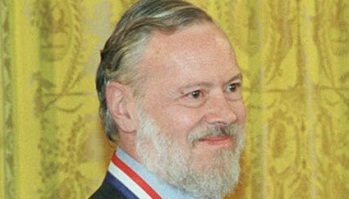Dennis Ritchie, Creator Of C And Unix, Dies Aged 70

Dennis Ritchie, creator of the C language and Unix, has died after a long illness, aged 70
The world has lost one its truly great computer scientists, with the death of Dennis Ritchie, creator of the C Language and co-developer of the Unix operating system.
C and Unix were the first successful systems designed for portability on the general purpose machines emerging in the early 1970s. They have shaped or influenced every subesquent programming language and operating system, and software that has descended from Ritchie’s original work in the 1970s is now embedded in billions of microprocessors and running on devices from phones up to supercomputers.
At the kernel of all software development?
 Dennis MacAlistair Ritchie was born in the Bronx on 9 September 1941, son of Bell Labs engineer Alistair E Ritchie, co-author of the book The Design of Switching Circuits.
Dennis MacAlistair Ritchie was born in the Bronx on 9 September 1941, son of Bell Labs engineer Alistair E Ritchie, co-author of the book The Design of Switching Circuits.
Ritchie followed his father’s footsteps, joining Bell Labs in 1967 after getting degrees in Physics and Applied Mathematics.
This was the period when the first microprocessors were being made, and at the same time general purpose minicomputers were challenging the tradition of large mainframes that could only respond to batch processes fed in on punched cards.
Interactivity was in the air, and so was the idea of portability – making operating systems and programs that could be ported and installed on different machines, instead of being purpose built for one system.
Ritchie, and his collaborator Kenneth Thompson, saw the end of the Multics project – a time-sharing system which Bell Labs dropped out of in 1969. The pair got access to a Digital Equipment PDP/11 minicomputer, and created the Unix operating system. At the same time, they created C, an easily portable programming language that could be put onto any new computer system.
Having done this, they rewrote the Unix operating system in the language, so it too could be moved to other machines.
The spread of Unix
In 1972, Unix was released, but Bell Labs’ parent AT&T was at the time forbidden from making money from non-telephony products, so Unix had to be given away.
This – along with the spread of cost-effective minicomputers – allowed it to spread widely, particularly in universities, and in the new commercial firms starting up during the 1970s and early 1980s.
During the 1980s, Unix was commercialised, as AT&T was broken up and freed from its earlier restrictions. At the same time, Richard Stallman began the GNU project to create a free operating system, which in turn crystallised the free software and open source software movements, and led to Linux.
Operating systems related to Unix include MacOS, Android, Linux and iOS. Through the standard Posix interface and then Interix, Unix commands have been included in Microsoft Windows for many years – and the kernel-based architecture of Windows, like that of all other operating systems, is also dependent on Ritchie’s work.
Ritchie was the archetypal programmer, working long hours, and delighting in sharing ideas and code with others. Known for his gentle wit, he became head of Lucent’s Systems Software Research Department at Bell Labs until he retired in 2007.
“Dennis was well loved by his colleagues at Alcatel-Lucent Bell Labs, and will be greatly missed,” said a statement from Jeong Kim, president of Alcatel-Lu
In 1983, Ritchie and Thompson were awarded the Turing Award for developing generic operating systems theory. In 1999, they received the National Medal Of Technology from US President Bill Clinton, for developing Unix and C.
Ritchie died at the weekend, after a long illness.